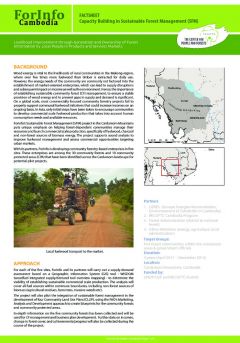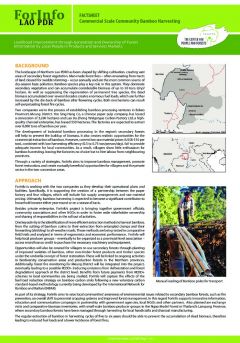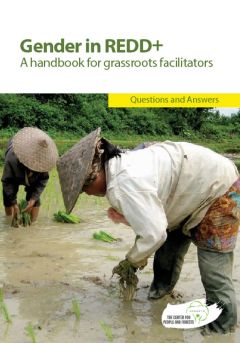Location
RECOFTC
RECOFTC is derived from an abbreviated form of the organization's legal name, Regional Community Forestry Training Center for Asia and the Pacific. Formerly the organization was known as RECOFTC – The Center for People and Forests.
RECOFTC – The Center for People and Forests is an international not-for-profit organization that focuses on capacity building for community forestry in the Asia Pacific region. It advocates for the increased involvement of local communities living in and around forests - some 450 million people in Asia-Pacific - in the equitable and ecologically sustainable management of forest landscapes.
The Regional Community Forestry Training Center for Asia and the Pacific (RECOFTC) opened in Bangkok, Thailand, in March 1987 with support from the United Nations Food and Agriculture Organization, the Government of Switzerland (through the Asian Development Bank), and Thailand's Kasetsart University.
Community forestry is widely acknowledged as a powerful solution for many of the challenges facing local people and the wider society, especially in improving rural livelihoods, enhancing community governance and empowerment, transforming forest-related conflict, protecting and enhancing the environment, and helping to fight climate change. As a capacity-building organisation, RECOFTC improves the ability of people and organisations to conduct community forestry effectively and sustainably.
RECOFTC works toward its mission through four thematic areas:
- expanding community forestry
- people, forests and climate change
- transforming forest conflict
- securing local livelihoods.
Members:
Resources
Displaying 266 - 270 of 485ForInfo Factsheet: Seima Community-Based Production Forestry
In what is a big step towards commercial community forestry, Cambodia’s Forest Administration, in partnership with RECOFTC and with technical assistance and funding from the Wildlife Conservation Society, began pilot testing in 2008 community-based production forestry in the Seima Biodiversity Conservation Area. It is an innovation unlike any other in the region in which communities are allowed to set up forest-logging operations in buffer-zone forest.
ForInfo Factsheet: Capacity Building in Sustainable Forest Management
Wood energy is vital to the livelihoods of rural communities in the Mekong region, where over five times more fuelwood than timber is extracted for daily use. However, the energy needs of the community are commonly not factored into the establishment of market-oriented enterprises, which can lead to supply disruptions and subsequent impact on income as well as the environment. Hence, the importance of establishing sustainable community forest (CF) management, to ensure a stable provision of wood energy and to prevent gaps in supply and demand is significant.
ForInfo Factsheet: Commercial Scale Community Bamboo Harvesting
Forinfo aims to strengthen the capacity of the Provincial Agriculture and Forestry Office (PAFO) by supporting the implementation of improved bamboo management within the two concession areas in Meung district. The project is partnering with officials from the Government of Lao PDR (GoL), from the national to district level, private enterprises, community associations, and other NGOs to foster a wider stakeholder responsibility and ownership of the activities.
Sustainable Forest Management: How Can it be Achieved Through Community Forestry
This policy brief discusses ways for governments to support community forestry based on the understanding that it can provide numerous economic, environmental and social benefits. The brief also highlights the challenges facing community forestry throughout the region and outlines recommendations for governments to further support community forestry as a pathway to inclusive development, where communities participate in decision-making and get equitable benefits, based on the principles of participation, non-discrimination and accountability.
Gender in REDD+: A Handbook for Grassroots Facilitators
The main objective of the handbook is to support local trainers and facilitators who are already familiar with climate change and REDD+. It provides them with useful information on gender considerations for climate change and REDD+ related training and capacity development programs.






